ulysses s grant
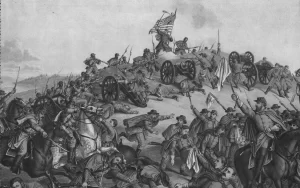 These days, it’s strange to think of battles being fought on US soil. We have begun to believe that a war, at least can’t take place on our soil anymore, because we have so many early warning systems to tell of any incoming missiles or planes, but that wasn’t always the case. The Civil War was one of the biggest wars fought on US soil, and strangely, we were fighting ourselves. Civil Wars are among the worst kinds, because there is so much anger and unrest. We have had a number of wars fought here, including the Civil War, which was clearly one of the worst on our soil. Wars are unpredictable, and the length of battles vary, with some long and drawn out, and some were just one or two days. The Battle of Nashville, Tennessee, fell into the latter category, fought on December 15 and 16, 1864, between the Confederate Army of Tennessee under Lieutenant General John Bell Hood and the Union Army of the Cumberland under Major General George H Thomas. The Battle of Nashville was part of the Franklin-Nashville Campaign.
These days, it’s strange to think of battles being fought on US soil. We have begun to believe that a war, at least can’t take place on our soil anymore, because we have so many early warning systems to tell of any incoming missiles or planes, but that wasn’t always the case. The Civil War was one of the biggest wars fought on US soil, and strangely, we were fighting ourselves. Civil Wars are among the worst kinds, because there is so much anger and unrest. We have had a number of wars fought here, including the Civil War, which was clearly one of the worst on our soil. Wars are unpredictable, and the length of battles vary, with some long and drawn out, and some were just one or two days. The Battle of Nashville, Tennessee, fell into the latter category, fought on December 15 and 16, 1864, between the Confederate Army of Tennessee under Lieutenant General John Bell Hood and the Union Army of the Cumberland under Major General George H Thomas. The Battle of Nashville was part of the Franklin-Nashville Campaign.
As far as battles go, the length does not necessarily have anything to do with the size of the victory. The Battle of Nashville was short, but it was also one of the largest victories achieved by the Union Army during the Civil War. Hood’s army was effectively destroyed when Thomas attacked and routed it as a capable fighting force. Amazingly, the Battle of Nashville was considered the only perfectly fought battle of the war, because it unfolded in “greater accordance with the victor’s battle plan” than any other clash of the war. Nashville, at that time was the second-most fortified city in America…second only to Washington DC, making the victory there an even greater one.
Although Thomas’s forces were much stronger than Hood’s army, Hood’s army was still a force to be reconned 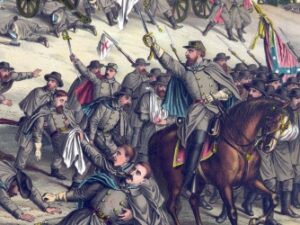 with and could not be ignored. Hood’s army had taken a severe beating at Franklin, but it nevertheless presented a threat by its mere presence and ability to maneuver. Therefore, Thomas knew he had to attack. He prepared cautiously, because he knew that Hood was not a complete pushover, and therefore, a poorly executed plan of attack could have ended in disaster. Thomas was concerned about his cavalry corps, because they were commanded by the energetic young Brigadier General James H Wilson, but they were poorly armed and mounted, and he did not want to proceed to a decisive battle without effective protection of his flanks. This was particularly important, since Wilson would be facing the horsemen of the formidable Forrest. Still, refitting the Union cavalry took time, so he had to be patient.
with and could not be ignored. Hood’s army had taken a severe beating at Franklin, but it nevertheless presented a threat by its mere presence and ability to maneuver. Therefore, Thomas knew he had to attack. He prepared cautiously, because he knew that Hood was not a complete pushover, and therefore, a poorly executed plan of attack could have ended in disaster. Thomas was concerned about his cavalry corps, because they were commanded by the energetic young Brigadier General James H Wilson, but they were poorly armed and mounted, and he did not want to proceed to a decisive battle without effective protection of his flanks. This was particularly important, since Wilson would be facing the horsemen of the formidable Forrest. Still, refitting the Union cavalry took time, so he had to be patient.
While Thomas knew what he was doing, Washington was not so patient, and in fact, they were fuming at the seeming procrastination. It was then that Sherman proposed his March to the Sea. Ulysses S Grant and Henry Halleck objected to it, because they thought that Hood would use the opportunity to invade Tennessee. In response, Sherman airily indicated that this was exactly what he wanted and that if Hood “continues to march North, all the way to Ohio, I will supply him with rations.” It sounded like a perfect plan, however, when the ever-confident Sherman disappeared into the heart of Georgia, Grant once again became concerned about an invasion of Kentucky or Ohio. Grant later said of the situation, “If I had been Hood, I would have gone to Louisville and on north until I came to Chicago.” His concern doubtless reflected Abraham Lincoln’s concern. Lincoln had little patience for slow generals and remarked of the situation, “This seems like the McClellan and Rosecrans strategy of do nothing and let the rebels raid the country.” Still, the plan to attack Nashville seems to have been the right move.
Washington continued to pressure Hood to push forward. Then on December 8, a bitter ice storm struck Nashville, stalling the plan again. While unusual for 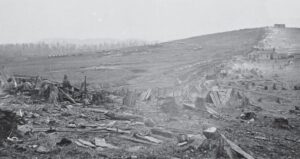 Nashville, the sub-freezing weather continued through December 12. Hood explained that to Grant, but when Thomas had still not moved by December 13, Grant directed that Major General John A Logan proceed to Nashville and assume command if Thomas had not yet initiated operations, by the time Logan arrived. Logan made it as far as Louisville by December 15, but on that day the Battle of Nashville had finally begun. A still impatient Grant left Petersburg on December 14, to take personal command. Apparently, he didn’t trust Logan much either. Once the battle began, Grant returned to Washington…a good thing, since three commanding officers might have been a bit awkward.
Nashville, the sub-freezing weather continued through December 12. Hood explained that to Grant, but when Thomas had still not moved by December 13, Grant directed that Major General John A Logan proceed to Nashville and assume command if Thomas had not yet initiated operations, by the time Logan arrived. Logan made it as far as Louisville by December 15, but on that day the Battle of Nashville had finally begun. A still impatient Grant left Petersburg on December 14, to take personal command. Apparently, he didn’t trust Logan much either. Once the battle began, Grant returned to Washington…a good thing, since three commanding officers might have been a bit awkward.
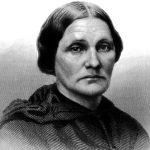 Nurses are the cornerstone of medicine in many cases. Yes, we must have doctors, but nurses are the support system that allows doctors to do their jobs. One such example was a woman named Mary Ann Bickerdyke. She was born on July 19, 1817 in Knox County, Ohio, to Hiram and Annie (Rodgers) Ball. She was married in 1847 to Robert Bickerdyke. The couple and their family moved to Galesburg, Illinois. After her infant daughter died suddenly, she vowed to learn more about medicine, studying herbal medicine at Oberlin College. Mary Ann was widowed in 1859. She was alone and the mother of two sons, who were in their adolescent years.
Nurses are the cornerstone of medicine in many cases. Yes, we must have doctors, but nurses are the support system that allows doctors to do their jobs. One such example was a woman named Mary Ann Bickerdyke. She was born on July 19, 1817 in Knox County, Ohio, to Hiram and Annie (Rodgers) Ball. She was married in 1847 to Robert Bickerdyke. The couple and their family moved to Galesburg, Illinois. After her infant daughter died suddenly, she vowed to learn more about medicine, studying herbal medicine at Oberlin College. Mary Ann was widowed in 1859. She was alone and the mother of two sons, who were in their adolescent years.
Widowed just two years before the Civil War began, she supported herself and her sons by practicing as a “botanic physician” in Galesburg. When a young Union volunteer physician wrote home about the filthy, chaotic military hospitals at Cairo, Illinois, the citizens of Galesburg collected $500 worth of supplies and selected Bickerdyke to deliver them. She left her sons with a neighbor, and after seeing the horrible conditions for herself, Bickerdyke decided that she was needed there, so she stayed as an unofficial nurse. Her never ending energy, and her dedication made her just the heroine the Union soldiers needed in those awful war years. She organized the hospitals and cleaned up the filth that served only to breed germs, and in doing so, she gained the respect and appreciation of Ulysses S. Grant.
While there, she worked alongside another famed Civil War Nurse, Mary J. Stafford. When Grant’s army moved down the Mississippi River, Bickerdyke went too, becoming the Chief of Nursing and setting up hospitals where 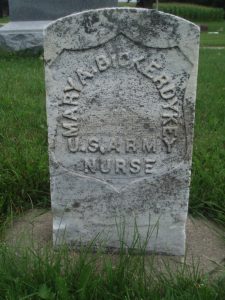 they were needed. Bickerdyke’s goal during the Civil War was to more efficiently care for wounded Union soldiers. She insisted on cleanliness, was dedicated to improving the level of care, and unafraid of stepping on male toes. That, in itself, was almost unheard of in that era. She was adamant about scrubbing every surface in sight, reported drunken physicians, and on one occasion ordered a staff member, who had illegally appropriated garments meant for the wounded, to strip. Though she antagonized male physicians, staff, and soldiers alike, in the name of better patient care, she won most of her battles…a good thing for the wounded soldiers.
they were needed. Bickerdyke’s goal during the Civil War was to more efficiently care for wounded Union soldiers. She insisted on cleanliness, was dedicated to improving the level of care, and unafraid of stepping on male toes. That, in itself, was almost unheard of in that era. She was adamant about scrubbing every surface in sight, reported drunken physicians, and on one occasion ordered a staff member, who had illegally appropriated garments meant for the wounded, to strip. Though she antagonized male physicians, staff, and soldiers alike, in the name of better patient care, she won most of her battles…a good thing for the wounded soldiers.
Union General William T. Sherman was especially fond of the volunteer nurse who followed the western armies. It is said that she was the only woman he would allow in his camp. When his staff complained about the outspoken, insubordinate female nurse who constantly disregarded the army’s red tape and military procedures, Sherman threw up his hands and exclaimed, “Well, I can do nothing for you, she outranks me.” Running roughshod over anyone who stood in the way of her self-appointed duties, when a surgeon questioned her authority to take some action, she replied, “On the authority of Lord God Almighty, have you anything that outranks that?” I guess Sherman was right when he said that she outranked him.
To the wounded soldiers, Bickerdyke was an angel. They affectionately called her “Mother” Bickerdyke, and she called them her “boys.” The soldiers would cheer here when she appeared. She was more loved than the celebrities of our day are for some fans. During the war, she worked closely with Eliza Emily Chappell Porter of the Northwest Sanitary Commission, worked on the first hospital boat, helped build 300 hospitals and aided the wounded on 19 battlefields including the Battle of Shiloh, the Battle of Vicksburg, and Sherman’s March to the 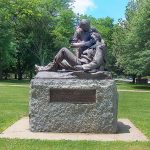 Sea. When the war was over, she rode at the head of the XV Corps in the Grand Review in Washington at General William T. Sherman’s request. Afterwards, she worked for the Salvation Army in San Francisco, and became an attorney, helping Union veterans with legal issues. Later, she ran a hotel in Salina, Kansas for a time before retiring to Bunker Hill, Kansas. She received a special pension of $25 a month from Congress in 1886. She died peacefully after a minor stroke November 8, 1901. Her remains were transported back to Galesburg, Illinois and she was interred next to her husband at the Linwood Cemetery. In memory of Bickerdyke’s selflessness, a statue of her was erected in Galesburg, Illinois. Two ships…a hospital boat, a liberty ship, and a cemetery in Kansas were named after her.
Sea. When the war was over, she rode at the head of the XV Corps in the Grand Review in Washington at General William T. Sherman’s request. Afterwards, she worked for the Salvation Army in San Francisco, and became an attorney, helping Union veterans with legal issues. Later, she ran a hotel in Salina, Kansas for a time before retiring to Bunker Hill, Kansas. She received a special pension of $25 a month from Congress in 1886. She died peacefully after a minor stroke November 8, 1901. Her remains were transported back to Galesburg, Illinois and she was interred next to her husband at the Linwood Cemetery. In memory of Bickerdyke’s selflessness, a statue of her was erected in Galesburg, Illinois. Two ships…a hospital boat, a liberty ship, and a cemetery in Kansas were named after her.
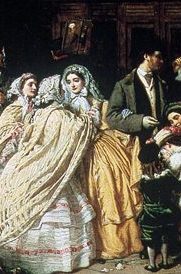 These days, with all the television shows about secret agents, undercover cops, and spies, most of us wouldn’t think twice about one of those positions being held by a woman. During the American Civil War, however, which basically coincided with the Victorian era, one of the most morally repressive eras in history for women, things were different. Everything from a woman’s dress to her education were tightly constricted by moral attitudes that governed her every action. Basically, women were to concentrate their “war efforts” on the task of supporting their husband, brothers, or fathers, in whatever their beliefs were toward the matter. However, as the war dragged on and more men were called into active duty, the farms, factories, stores, and schools were left without workers, so the women stepped up to stand in the gap, as it were. This was most surprising because, back then, women were considered too frail, and their minds too simple for things like politics and war. They were designed for keeping the home and taking care of the babies. Nevertheless, when the men were called into active duty, most of them would have lost their farms, homes, and businesses had it not been for the strength and intelligence of the of the “frail and simple” women. Many women refused to limit their assistance to their country to what could be accomplished close to home. Some of them became nurses, worked to raise supplies for their troops, or even worked in armories, but there was a number of these women decided to support their country in a more dangerous…and scandalous way…they became spies.Back then, espionage was considered a very dishonorable pursuit for a man during the Civil War era, but for a woman…it was tantamount to prostitution. Nevertheless, with the war raging, women of both the North and South flaunted the Victorian morality of the time to provide their country the intelligence it needed to make tactical and practical decisions.
These days, with all the television shows about secret agents, undercover cops, and spies, most of us wouldn’t think twice about one of those positions being held by a woman. During the American Civil War, however, which basically coincided with the Victorian era, one of the most morally repressive eras in history for women, things were different. Everything from a woman’s dress to her education were tightly constricted by moral attitudes that governed her every action. Basically, women were to concentrate their “war efforts” on the task of supporting their husband, brothers, or fathers, in whatever their beliefs were toward the matter. However, as the war dragged on and more men were called into active duty, the farms, factories, stores, and schools were left without workers, so the women stepped up to stand in the gap, as it were. This was most surprising because, back then, women were considered too frail, and their minds too simple for things like politics and war. They were designed for keeping the home and taking care of the babies. Nevertheless, when the men were called into active duty, most of them would have lost their farms, homes, and businesses had it not been for the strength and intelligence of the of the “frail and simple” women. Many women refused to limit their assistance to their country to what could be accomplished close to home. Some of them became nurses, worked to raise supplies for their troops, or even worked in armories, but there was a number of these women decided to support their country in a more dangerous…and scandalous way…they became spies.Back then, espionage was considered a very dishonorable pursuit for a man during the Civil War era, but for a woman…it was tantamount to prostitution. Nevertheless, with the war raging, women of both the North and South flaunted the Victorian morality of the time to provide their country the intelligence it needed to make tactical and practical decisions.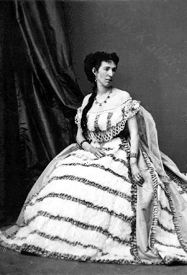
The most famous of these female spies was Belle Boyd…born Marie Isabella Boyd. She began spying for the Confederacy when Union troops invaded her Martinsburg, Virginia home in 1861. One of the Federal soldiers manhandled her mother, and Boyd shot and killed him. She was exonerated in the soldier’s death, and an emboldened Boyd managed to befriend the Union soldiers left to guard her, and used her slave, Eliza, to pass information confided in her by the soldiers along to Confederate officers. Boyd was caught at her first attempt at spying, and threatened with death, but she did not stop her activities. She vowed to find a better way instead. She began eavesdropping on union officers staying at her father’s hotel. She learned enough to inform General Stonewall Jackson about their regiment and activities. Taking no chances, this time, Boyd delivered her intelligence firsthand, moving through Union lines, and reportedly drawing close enough to the action to return with bullet holes in her skirts. The information she provided allowed the Confederate army to advance on Federal troops at Fort Royal. Boyd’s daring acts of espionage soon caught up with her again and when a beau gave her up to Union authorities in 1862, she was arrested and held in the Old Capitol Prison in Washington for a month. Then she released, but found herself in the arrested again soon after. Once again, she managed to be set free, and this time she traveled to England, where amazingly, she married not a Confederate soldier, but a Union officer.
Boyd wasn’t the only spy in the Civil War. Another famous female spy was nicknamed “Crazy Bet,” but her real 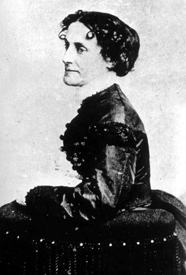 name was Elizabeth Van Lew. Van Lew was born to a wealthy and prominent Richmond family, and was educated by Quakers in Philadelphia. When she returned to Richmond, she had become an abolitionist. She even went so far as to convince her mother to free the family’s slaves. Her espionage activity began soon after the start of the war. Her neighbors were appalled, because she openly supported the Union. She concentrated her efforts on aiding Federal prisoners at the Libby Prison, by taking them food, books, and paper. Later, she smuggled information about Confederate activities from the prisoners to Union officers, including General Ulysses S. Grant. To hide her activities from her Confederate neighbors, she behaved oddly. She dressed in old clothes, talking to herself, and refusing to comb her hair. Believe it or not, people began to think she was insane. They started calling her “Crazy Bet.” Van Lew wasn’t insane, in fact, she was incredibly intelligent. She was hailed by Grant as the provider of some of the most important intelligence gathered during the war.
name was Elizabeth Van Lew. Van Lew was born to a wealthy and prominent Richmond family, and was educated by Quakers in Philadelphia. When she returned to Richmond, she had become an abolitionist. She even went so far as to convince her mother to free the family’s slaves. Her espionage activity began soon after the start of the war. Her neighbors were appalled, because she openly supported the Union. She concentrated her efforts on aiding Federal prisoners at the Libby Prison, by taking them food, books, and paper. Later, she smuggled information about Confederate activities from the prisoners to Union officers, including General Ulysses S. Grant. To hide her activities from her Confederate neighbors, she behaved oddly. She dressed in old clothes, talking to herself, and refusing to comb her hair. Believe it or not, people began to think she was insane. They started calling her “Crazy Bet.” Van Lew wasn’t insane, in fact, she was incredibly intelligent. She was hailed by Grant as the provider of some of the most important intelligence gathered during the war.
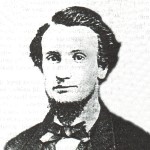 My Uncle Bill has been a self proclaimed “gun nut” for years. He collected them, sold them, traded them, and went to gun shows for many years to deal his guns. He knows more about guns than most people know about themselves. I don’t remember a time that he didn’t deal guns. He knew about guns of all kinds, and could talk to you for hours about any gun you wanted to discuss, but by far his favorite, was the Spencer Rifle. He was always into the family history, and the inventor of the Spencer Rifle was an ancestor of ours, so that held particular interest for my Uncle Bill. What has always alluded my uncle, however, was exactly how we are related to Christopher Miner Spencer. Knowing how long and hard he has searched for that relationship, and that dementia has now stopped that search for him, made me sad. I decided to expand my own records in search of the elusive relationship…doing so for me, but more importantly for my Uncle Bill. I only wish he would be able to remember it once we tell it to him. As I searched, first backward from Christopher to someone I recognized, and then forward in my own tree to Christopher, my thoughts centered on my uncle and how excited he would be. I intend to write him a letter and include my story, and I only wish I could be there to see his face light up. My search finally paid off, and I know that Christopher Miner Spencer is my 5th cousin 5 times removed. I believe that would make him my uncle’s 5th cousin 4 times removed. Now that I have the relationship straight, I feel like I can proceed with the story about this amazing man.
My Uncle Bill has been a self proclaimed “gun nut” for years. He collected them, sold them, traded them, and went to gun shows for many years to deal his guns. He knows more about guns than most people know about themselves. I don’t remember a time that he didn’t deal guns. He knew about guns of all kinds, and could talk to you for hours about any gun you wanted to discuss, but by far his favorite, was the Spencer Rifle. He was always into the family history, and the inventor of the Spencer Rifle was an ancestor of ours, so that held particular interest for my Uncle Bill. What has always alluded my uncle, however, was exactly how we are related to Christopher Miner Spencer. Knowing how long and hard he has searched for that relationship, and that dementia has now stopped that search for him, made me sad. I decided to expand my own records in search of the elusive relationship…doing so for me, but more importantly for my Uncle Bill. I only wish he would be able to remember it once we tell it to him. As I searched, first backward from Christopher to someone I recognized, and then forward in my own tree to Christopher, my thoughts centered on my uncle and how excited he would be. I intend to write him a letter and include my story, and I only wish I could be there to see his face light up. My search finally paid off, and I know that Christopher Miner Spencer is my 5th cousin 5 times removed. I believe that would make him my uncle’s 5th cousin 4 times removed. Now that I have the relationship straight, I feel like I can proceed with the story about this amazing man.
Christopher Spencer was trained as a machinist beginning at the tender age of 14 years, while working as an apprentice in a silk manufacturing company and then went to work at the Samuel Colt factory in Hartford, Connecticut, where he learned arms making. The colt factory made pistols and other side arms, but Christopher was convinced that he could design a breech-loaded repeating rifle that would be easily and rapidly reloaded. Once he had his rifle…the Spencer rifle finished, it was put through rigorous testing, including burying it in the sand and immersing it in salt water overnight. The rifle fired successfully over 250 times, with only one misfire. The gun was shown to army and navy commanders, including General Ulysses S Grant, who called it “the best breech loading arms available”. The next step was to take it to the White House.
On August 17, 1863, Christopher Spencer arrived at the White House with the rifle in hand. Imagine that happening today…you couldn’t do it. Abraham Lincoln, 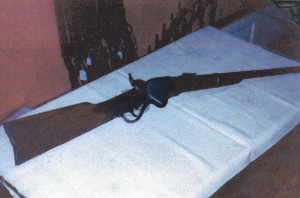 welcomed Christopher into the White House, and after a brief introduction, the two men went over the rifle top to bottom and inside out. The President then invited Christopher back to the White House for a demonstration to take place on The Mall…another amazing thought in this day and age. The demonstration took place the next day, and the rifle headed to the Civil War. In fact, the rifle was to the Civil War what the Atomic Bomb was to World War II. Uncle Bill was always proud that a Spencer ancestor had made such a remarkable and valuable contribution to the victory in the Civil War.
welcomed Christopher into the White House, and after a brief introduction, the two men went over the rifle top to bottom and inside out. The President then invited Christopher back to the White House for a demonstration to take place on The Mall…another amazing thought in this day and age. The demonstration took place the next day, and the rifle headed to the Civil War. In fact, the rifle was to the Civil War what the Atomic Bomb was to World War II. Uncle Bill was always proud that a Spencer ancestor had made such a remarkable and valuable contribution to the victory in the Civil War.

